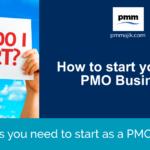Entrepreneurs create their own businesses because they have an idea, passion, and skills. They bring energy into the organisation they create and drive innovation. Seemingly on the contrary, a project management office, or PMO, is about governance and processes.
With start-ups and PMOs possibly at odds with each other, how do go about pitching a PMO to start-up founders? We’re going to look at:
- Getting buy-in for your PMO
- How to choose the right PMO style
- The positives that’ll help you sell the idea
- Handling objections you’re going to come up against
How do I find a sponsor for my PMO?
Identifying that a start-up needs a PMO is one thing, getting it off the ground is quite another. You’ll have come up with the idea because you’re a project manager or a manager of a PMO by trade.
Whether you’ve been recruited to deal with all the projects going on, or have seen a gap in the company, you need to get someone’s support first. You need someone to pitch to.
Assess the projects in the company and see which areas they benefit and where the issues are. If projects are suffering massive budget overruns and there’s not clear returns coming in, you probably want to speak with the Chief Financial Officer.
Projects that aren’t delivering what they’re supposed to or aren’t allocating resources effectively would probably fall under the remit of the Chief Operating Officer. Not got the right people or projects are getting people’s backs up? Head for the Chief Talent Officer.
Whom you’re aiming your pitch at is going to determine the language you use and the evidence you present.
Which PMO style is right for the start-up I’m at?
Broadly, there are two types of PMO, a business-focussed PMO and a traditional PMO. The needs of the business is going to dictate which one you choose to pitch to your potential C-suite sponsor.
- Choose to pitch a business-focussed PMO when the business is spending lots of money on projects and not seeing a good ROI
- Opt to pitch a traditional PMO when the paper trail of projects is sparse and tasks are getting duplicated across the business
You’ve got the chance to get in on the ground with a PMO at a start-up. You get to choose what your experience tells you will work best and make a case for it.
What are the salient points to make in a PMO pitch?
Pitching to set up a PMO in a start-up is different to doing it in a large and long-established company. There are specific challenges that a start-up faces that you’d expect to have been dealt with in a scale-up or mature business.
Here’s how some of the key benefits of a PMO translate to the special circumstances of a start-up:
- Financial control – in general, a start-up is pretty loose with its finances, it’s all about getting the project off the ground. A PMO can bring order to spending and rein in any excesses.
- Focus – the energy and vigour in a start-up can pull resources and talent in lots of directions. Establishing a PMO will create a point of focus for the project work that goes on.
- Standards – start-ups can be pretty easy-going places on the processes and procedures front, with loosely defined job roles and goals. Creating a PMO will set up standards for projects and bring definitions and guidelines into the office.
- Clarity – moving a pace can mean not everyone knows what’s going on across the piece and work can get duplicated. PMOs get a handle on everything being worked on in terms of projects
Here’s a couple of examples of challenges you might come up against and how you can approach them:
- The business can’t bear the extra cost – can it afford not to make the investment?
- It’ll stifle creativity – the creative energy needs to be directed to the right place
- Things move too fast for processes – how will you duplicate successes without a plan to follow?
The take home
It can be assumed that a PMO is only necessary for large companies with hefty amounts of projects being worked on. They are, however, just as valuable for a start-up.
Pitching a PMO to start-up founders needs to focus on the unique challenges faced by start-ups in general, and their company in particular. Learning about the business and finding the right sponsor should allow you to make successful arguments.






